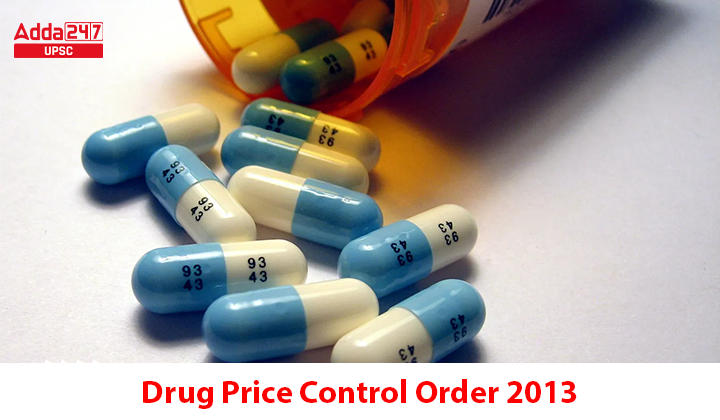Table of Contents
Drug Price Control Order 2013: Drug Price Control Orders (DPCO) are regulatory measures authorized by the Essential Commodities Act (ECA) in India, with the Government of India acting as the issuing authority. These orders empower the government to establish an upper limit for the prices of essential and life-saving medicines, following a prescribed formula. Notably, in January 2019, the Ministry of Chemicals and Fertilizers introduced the Drugs (Prices Control) Amendment Order, 2019. This amendment aimed to strike a harmonious balance between the interests of consumers and producers.
This article aims to furnish pertinent information concerning Drug Price Control Orders (DPCO) in the context of IAS Exam preparation, a topic encompassed within UPSC Mains GS-II, “Government policies and interventions for development in various sectors and issues arising out of their design and implementation.”
What is Drug Price Control Order 2013?
- The Department of Pharmaceuticals, part of the Ministry of Chemicals and Fertilizers, introduced the Drugs Price Control Act, 2013 with the aim of enhancing the accessibility of fundamental medicines at affordable rates throughout the nation.
- This directive, issued by the Government of India under Section 3 of the Essential Commodities Act, 1955, serves to oversee the pricing of pharmaceuticals within the country. The responsibility for enforcing the provisions of the DPCO 2013 falls under the purview of the National Pharmaceutical Pricing Authority (NPPA).
- This legislation was enacted in May 2013 and had a substantial impact on the pricing of more than 300 essential medicines, which were now determined based on their manufacturing costs. According to the DPCO 2013, all formulations listed in the National List of Essential Medicines (NLEM) are subject to price regulation.
Why was Drug Price Control Order implemented?
Several key factors need consideration in order to grasp the relevance of the Drug Price Control Order:
- Some pharmaceutical companies engaged in price hikes to maximize profits, adversely impacting everyday consumers.
- The surging prices created affordability challenges for the common man, making it difficult for them to afford essential medicines.
In response to this issue, the Government of India introduced the Drug Price Control Order to establish price guidelines for essential drugs, ensuring they remain affordable and accessible to the public.
What is an Essential Medicine?
Essential medicines are those that cater to the healthcare needs of the majority of the population. This concept was originally introduced by the World Health Organization (WHO) in 1977. The classification of medicine as ‘essential’ hinges on the following criteria:
- Its significance for public health.
- Substantiated evidence of its effectiveness and safety.
- Comparative cost-effectiveness.
Key Attributes of Essential Medicines:
- Availability in ample supply at all times.
- Consistent availability in appropriate dosage forms.
- Assured quality and comprehensive information.
- Affordability for both individuals and communities.
The Drug Price Control Order (DPCO) underscores the necessity of implementing measures to streamline the use of essential medicines. Some actions that the government can take include:
- Enforcing clinical guidelines for pharmaceuticals (with the DPCO serving as an illustration).
- Advocating the establishment of drug committees at district and hospital levels.
- Ensuring effective oversight, audit, and feedback mechanisms.
- Boosting public awareness about medicines.
- Allocating adequate government funds to ensure the accessibility of medicines and skilled personnel.
Insight into Drugs (Prices Control) Amendment Order, 2019 for UPSC Aspirants
Drug Price Control Order (DPCO): Read here about the facts of Drug Price Control Order (DPCO) Amendment 2019 provided in the table below:
| Drug Price Control Order (DPCO) Amendment 2019- Fact | |
| Introduction | Ministry of Chemicals and Fertilizers |
| Main DPCO Amendments | 1. A drug manufacturer introducing an innovative patented drug is exempt from price control regulations for 5 years (from the date of marketing). 2. The Department of Pharmaceuticals (DoP) received recommendations for the amendments from NITI Aayog. 3. Drugs used to treat rare or “orphan” diseases are also exempt from price control to promote their production. 4. The Central government continues to determine prices based on available market data. 5. Market-based data is sourced from a pharmaceutical market data specialist company as determined by the government. 6. If needed, the government may validate such data through a suitable survey or evaluation. |




 TSPSC Group 1 Question Paper 2024, Downl...
TSPSC Group 1 Question Paper 2024, Downl...
 TSPSC Group 1 Answer key 2024 Out, Downl...
TSPSC Group 1 Answer key 2024 Out, Downl...
 UPSC Prelims 2024 Question Paper, Downlo...
UPSC Prelims 2024 Question Paper, Downlo...
